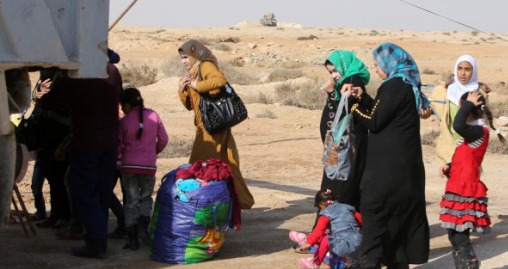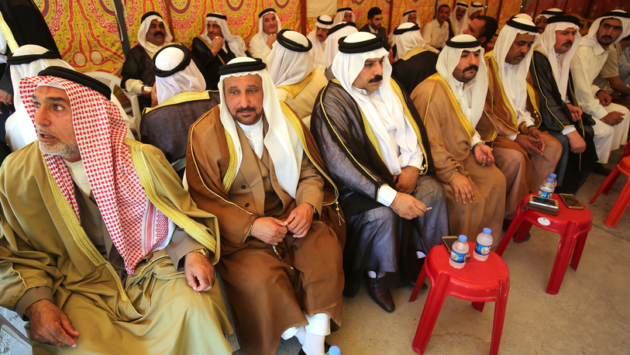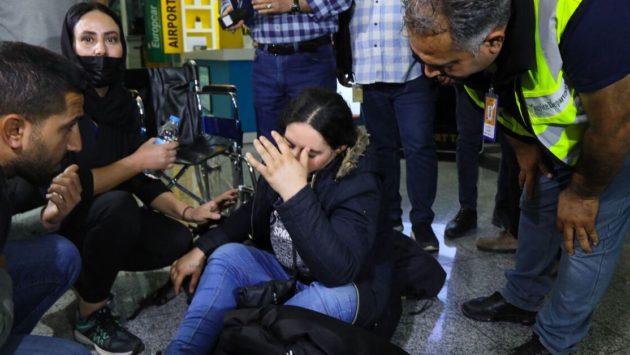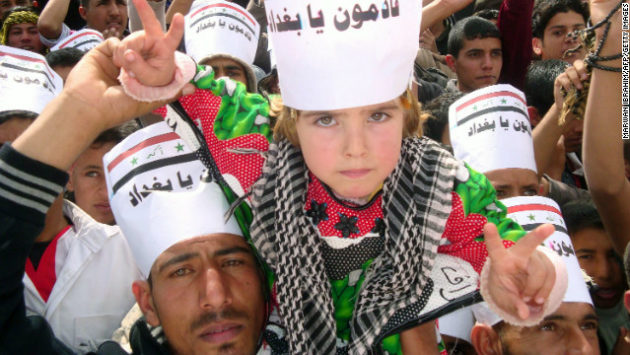Sunni refugees from Anbar sheltered by shiites in Karbala
Niqash | Abbas Sarhan | Karbala
The fighting between locals and the Iraqi army in Anbar is driving families from their homes and into other parts of Iraq. And because the road north is closed by security forces, many Sunni Muslims are being forced to find shelter with their Shiite Muslim neighbours in Karbala. NIQASH rides with one refugee family from Anbar to Karbala.
She could not stop thinking of how dangerous their journey was, the whole way from the city of Fallujah in the Anbar province to the city of Ayn al-Tamer in Karbala province.
So to stop herself from worrying, the 38-year –old mother who wanted to be known only as Umm Mohammed, or “mother of Mohammed”, began to stroke her children’s heads – they were sitting next to her in the car that was taking them away from their homes.
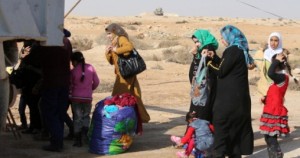
Her husband, also Mohammed, was sitting in the passenger seat and to distract himself, he engaged the driver in conversation; they were discussing what was going in the family’s hometown, Fallujah.
But there was one question that would have to remain unanswered: What was the fate of this small Sunni Muslim family fleeing the crisis at home for a Shiite Muslim area in the mainly Shiite Muslim province of Karbala?
Sectarian antipathy has increased in Iraq over the past few months. After the US invasion that toppled the regime of former Iraqi leader Saddam Hussein in 2003, the country saw these antipathies turn into full blown hatreds and long standing historical grievances that brought the country to the brink of civil war. However over the next few years, the population, traumatised by apparently senseless violence and counselled by US forces in their midst who provided a buffer between the two sects, the last four years have been comparatively calm. However now old enmities seem to be being fuelled again, this time by the Shiite Muslim-led government’s management – or mis-management – of long term, Sunni Muslim anti-government demonstrations.
When the Iraqi army broke up the demonstrations in Anbar, which had been going for almost a year, there was chaos in two major cities in Anbar. The Iraqi government said that Sunni Muslim extremists affiliated with terror organisation, Al Qaeda, had taken over the cities. However locals in Anbar say that the armed men running the cities are just the sons of local Sunni Muslim tribes who were protesting what they see as unjust government policies and who now feel they’ve been forced to take up arms.
Unfortunately in between the two versions of this story there are many dead and wounded as well as hundreds of families who have decided to leave Anbar and head for somewhere safer. The UNHCR, the United Nation’s refugee agency, estimates that 70,000 people have been displaced by fighting and insecurity in central Iraq’s Anbar province.
Along with many others, Mohammed and his family are heading to Karbala because the road to Baghdad was closed and security made it impossible to enter the Iraqi capital coming from Fallujah. As they travelled down the road though, they have no idea whether the road into Karbala will be any safer for them.
On the outskirts of Ayn al-Tamer in Karbala, the car is stopped at a checkpoint. The Iraqi military inside the checkpoint are tense. The family’s car is halted and they are told to get out and hand over their identification cards or passports.
Once again, the family grows anxious. Umm Mohammed recalls seeing how, a few hours before she left Fallujah, local police simply dropped their arms and uniforms and left the area. Masked gunmen came up behind them and took all the equipment. The masked gunmen had then set up their own checkpoints, although these were not official any longer. And she was worried this would be the case here too.
As the cars that had brought them to this checkpoint began to depart – they were returning to Fallujah – men dressed in civilian clothes told the various families gathered to queue up and then they worked their way down the queue, checking that everybody was who they said they were.
Now all the families, including Mohammed’s, just had to wait. Many of them clutched the bags they had packed so hastily – some families had left their homes very quickly and had not managed to bring much with them.
A few meters away from the checkpoint, is Khaled with his family. The 47-year-old Fallujah man was not sure he had done the right thing. He didn’t know how long they would need to be away from their homes, what would happen to his job or if they would be able to go back at all.
He alternated between thanking God that his family had managed to leave Fallujah safely and wondering if leaving had been a good idea. What if the conflict goes on and our house is damaged?, he asked. Where will my kids go to school?
Finally the security inspections were complete and the families were allowed to enter Ayn al-Tamer. There were all kinds of greetings for them on the other side of the checkpoint- some people had relatives there; there were also non-governmental organizations and state authorities there to provide assistance to the internally displaced Iraqis.
Mohammed and his family spend the next two days at the home of a Shiite Muslim family in Ayn al-Tamer. At first Umm Mohammed says she was worried, especially because everybody was continuously watching television reports about the situation in Anbar and she says there were a lot of people giving speeches on television, inciting hatred and violence. However their Shiite Muslim hosts never made the Sunni Muslim refugees feel bad and the adults of the family began to talk about the importance of living together in peace and how this might be achieved.
On the third day of their stay in Ayn al-Tamer, their family and many others were invited to come and stay in a special tourist village in the south of Karbala. The village was built by local authorities to host some of the millions of tourists and groups of pilgrims who come through Karbala every year. A delegation from Karbala’s supreme religious authority, headed by the country’s highest Shiite Muslim cleric, the Grand Ayatollah, Ali al-Sistani, invited the refugees to a hall in Ayn al-Tamer and told them they could come and stay in the visitor’s village if they wanted. Transport would be arranged to take them there.
“In the beginning I was scared,” admits Umm Mohammed. “Because of the things I used to hear about. And I was hesitant – like many others in our situation. But we felt the delegation that spoke with us was sincere so we accepted their invitation.”
Today the Mohammed family, along with Khaled’s family, is still in residence at the tourist village. “We have a place to rest and we are comfortable and safe,” Umm Mohammed says, although she admits she is still worrying a lot about when and whether they will be able to return to Fallujah.
The mayor of Ayn al-Tamer was also happy to share his feelings about the fact that Sunni Muslim Iraqis are seeking shelter in a Shiite Muslim area. “There’s nothing wrong with it,” Raded Faddal al-Mashadani told NIQASH. “We don’t think it is strange at all that people should seek shelter here. In fact a lot of families from Fallujah have relatives here in this district.”
“Many of Ayn al-Tamer’s residents have opened their doors to the displaced people of Fallujah. To me this is a clear indication of the strong ties that bind the Iraqi people together,” he concluded.

